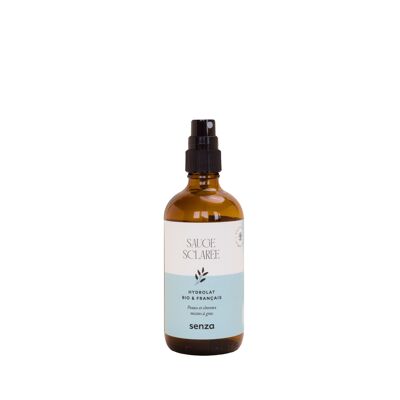

Clary Sage Water (Hydrolat)
Clary Sage hydrosol (Salvia sclarea L.) from distillation by steam distillation. Very aromatic hydrolat and resulting from a traditional distillation for a volume of plants/same volume of steam, there is no dilution and all the properties are therefore preserved. Completely natural and without additives, the hydrosol is microfiltered in the laboratory. The hydrosol is a very fragile product, so it is important to keep it away from heat and light. Consume within 6 months after opening if the organoleptic qualities and appearance are preserved. Cultivation in organic farming and distillation carried out by Claire at La Fabrique Végétale. Botanical family (Lamiaceae) Distilled part (flowering aerial parts) Origin (France, Seine-et-Marne) Smell: fresh, herbaceous, powerful, notes of musky ambergris, very subtle For traditional and therapeutic uses, we recommend the following works: "Floral waters and hydrolats" (Claire Montésinos); "Hydrolats and floral waters" (Xavier Fernandez, Carole André, Alexandre Casale); "Scientific and Medical Aromatherapy Treatise, Les Hydrolats" (Michel Faucon). Very aromatic hydrolat and resulting from a traditional distillation for a volume of plants/same volume of steam, there is no dilution or addition of preservative. All the pure and natural properties are therefore preserved. Sizes available: 125ml and 550ml "By its morphology and its feminine and refined fragrance, Clary Sage expresses a very different symbolism (and yet very complementary) to that of the severe Sage officinalis. The warm colors of its corolla, its natural aroma, everything is at home indeed sensual , loaded with soft, enveloping, conciliatory, instinctive and almost animal tones very linked to its young femininity.Its flowers with a still green scent leave us with a sweet feeling of unfinished...Clary sage was used in the Middle Ages for On another level in the tradition, healers, priests, shamans or other alchemists believed that Clary Sage was suitable for expanding visionary abilities and helping beings to better distinguish between good and evil. compassion and "the vision of the essential". Excerpt from "What the plant evokes in us" by Michel Faucon.
LA FABRIQUE VEGETALE store also offers


Roman chamomile water (Hydrolat)

Rose Geranium Water (Hydrolat)

Italian Helichrysum Water (Hydrolat)

Noble laurel water (Hydrolat)

Cornflower Floral Water

Italian Helichrysum essential oil (Helichrysum italicum) - Corsican type

Roman chamomile essential oil (Chamaemelum nobile)

Clary sage essential oil (Salvia sclarea)

Thyme essential oil with Thujanol (Thymus vulgaris thujanoliferum)

Rose Geranium (Pelargonium graveolens) Essential Oil
Products you may like

Clary Sage Hydrosol (250 ml) | Organic, Artisanal, Made In France

Organic clary sage essential oil

Hydrolat de Sauge officinale – Salvia officinalis

Clary Sage Essential Oil (5 ml) | Organic, Artisanal, Made In France

Organic Clary Sage Hydrosol

Sage hydrosol (250 ml) | Organic, Artisanal, Made In France

Organic Clary Sage Floral Water - 200ml

clary sage

Organic Clary Sage Floral Water - 1 liter

HE CLARY SAGE AB* 5ml

ORGANIC SAGE HYDROLATE - FLORAL WATER - 100ML

Sage officinalis organic floral water

ORGANIC CLARY SAGE ESSENTIAL OIL - 10 ML

Organic Clary Sage Essential Oil - 10 ml

Clary sage organic essential oil

